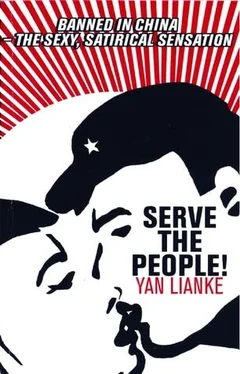`It's almost morning,' she said, `come back to bed.' At last he tried to explain himself to her, in sentiments worthy of the most exemplary socialist realist hero.
`I miss the barracks,' he sighed. `Home's no fun, compared to the army.' And with that he turned and followed her back home.
After a month in Wujiagou-almost no time at all- Wu Dawang felt permanently on edge, as if his home were no longer home but a place of unbearable foreign exile. Whenever his eyes fell on the portrait of Chairman Mao hanging on the wall in his house, his expression would become distant, distracted, for reasons no one around him could have guessed. When he saw a plaster statue of the Chairman devoutly displayed on a neighbour's table, he would run his hand lovingly over it. If he passed a pupil from the village school carrying a copy of The Qtotatiozzd of Chau'rnzazz Mao, he would stop the child, flick aimlessly through the pages, then, equally aimlessly, hand it back. When, in the distance, he spotted the postman from town approaching the village, he would go out into the road to wait for him.
`Anything for me?' he would bellow, while the postman was still a way off.
`No,' the reply would drift back.
`No telegram?'
`If a telegram comes foryou,' the postman would say, as he drew closer, `you'll get it the night it arrives.'
One day, as he watched the postman cycling back into the distance, Wu Dawang impulsively sprinted after him, pulling so hard on his back pannier that the whole bike almost toppled over.
Sure there's nothing for me?'
`What's wrong withyou? You sick or something?' the man shouted back at him. `Go back to the army and see a doctor!'
Wu Dawang stood at the edge of the village, staring at the departing postman like a man in love, unable to take his eyes off him until the blue post office bicycle faded into a pale dot, then disappeared in the late autumn sunlight.
In the end he withdrew almost entirely into himself. Unless his daily round of chores obliged him to do otherwise, he would not address a single word to either his wife or son.
The whole overheated situation came to a head after he discovered, as he was mucking out the pigpen in the yard, a battered, wooden sign with `Serve the People!' inscribed across it in black ink. Though the text was neither attributed to Mao Zedong nor illustrated with stars, ears of wheat or rifles, Wu Dawang placed the sign on the filthy wall of the pigpen and glanced at it every time he threw out a shovel of dung. When he was ready to haul the dung out to the fields, he hung the sign on the carrying pole that he placed across his shoulders. As he ploughed and sowed, he left the sign at the edge of the field. When he took his son out to play, he would rest it on a branch.
One day, when his son accidentally trod on the sign after it had fallen from its branch. Wu Dawang slapped him so hard that bright red welts immediately sprang up on the little boy's face. Neither his wife nor his fellow villagers now felt they could responsibly stand by and allow matters to continue in this way. And so Wu Dawang's wife went looking for the leader of the village's production team and poured out some of the more perplexing details of their married life. In the first month Wu Dawang had been back, she related, he had not touched her once. But since he'd got hold of that sign, every night he would place it at the head of the bed, and every night he would want it. And when they did it, he treated her like — like an animal.
The team leader decided to pay Wu Dawang a visit that very day.
'Why are you still at home?' he asked first. `Army leave is never more than a month, and you've been back almost six weeks now. Have they thrown you out for doing something wrong? If you've not been discharged, go back as soon as you can. If you're ill, get treated for it there. No one here can afford doctors or medicine, and you can't carry on like this. It's bad for you, and it's bad for your family.'
This conversation took place in the courtyard of Wu Dawang's thatched house. When the team leader arrived, Wu Dawang had been about to start building an energy-saving stove to reduce the family's fuel costs, making use of some of the skills he had learnt in the army. Because he needed silt from the courtyard, he had perched the Serve the People! sign on a pile of yellow earth. As he got up to leave, in order to emphasize his views about a certain other private matter, Wu Dawang's visitor glanced at the sign, then sent it flying with a single, well-aimed kick. Bits of rotten wood scattered over the courtyard like falling leaves, as the text disintegrated into unintelligible fragments.
The next day Zhao Ezi's father bustled over to the village. Because the venerable accountant was now so old that he himself had no further prospect of advancement, because he had toiled his whole life away in the commune without getting any of his sons or daughters moved to the city, the lines of angry frustration had sunk deep into his broad, weatherbeaten face. On reaching Wu Dawang's house, he refused either to drink the water his daughter poured for him or to sit down on the stool that his son-inlaw offered him, choosing instead to deliver his judgement standing up.
`I made the biggest mistake of my life when I let my daughter marry you.'
He drew Wu Dawang's neatly folded prenuptial agreement from an envelope, opened it out, batted furiously at the signature with his hand, flung it at his son-in-law and then stalked off back to the commune to complete the canteen's end-of-month accounts.
The document fluttered to the sandy ground, the sallow white of the paper almost exactly matching the colour of Wu Dawang's face.
The next day, he strapped his luggage together and returned to barracks.
BY TRAIN, BUS AND EVEN juddering tractor, Wu Dawang travelled the two days and one night back to his Division. He was hardly tired by his long journey-all that mattered was that soon he would be back in barracks, and with this knowledge his heart seemed to beat faster the closer he got. His face was sweating with excited anxiety-as if he were a felon returning to turn himself in to the authorities.
On the final leg of his journey, as he walked up to the barracks, the plump autumn sun shone golden light through the trees lining the road, through the leaves that were starting to fall. It was so bright that he needed to squint whenever he glanced upward.
Though the sentry on duty at the main gate did not know him personally, it was obvious from his luggage that Wu Dawang was just back from home leave. Standing to attention, he saluted Wu Dawang and called out a cheery `Afternoon!' A little nonplussed by this semiformal, semicasual greeting, Wu Dawang nodded back at him and raised his arms slightly, to explain his failure to return the salute.
`Sorry,' he said, `too many bags.'
`No matter, no matter,' the sentry replied, smiling at him. `Just back from leave?'
`That's right,' Wu Dawang answered.
'Why d'you bother coming back? Your company would have sent your things on to you.'
He stared uncomprehendingly at the sentry, as if puzzling at an insoluble equation. Noticing his bafflement, the sentry flashed Wu Dawang a cryptic smile. `So you've not heard? Ali well-ignorance is bliss.'
`Heard what?' he asked, still staring and increasingly perplexed.
`Go back to barracks. You'll find out soon enough.'
`What on earth's happened?'
`You'll find out.'
Wu Dawang walked on.
It was usual practice for orderlies, when they returned from home leave, to report first to the house of the senior commanding officer they served. Only when the gifts brought back for him and his family had been handed over and all good wishes conveyed and received was an orderly allowed to go back to his company. But this time, for obvious reasons, Wu Dawang broke with custom and walked, a little shakily, straight past Compound Number One, casting only the briefest of glances in its direction.
Читать дальше












